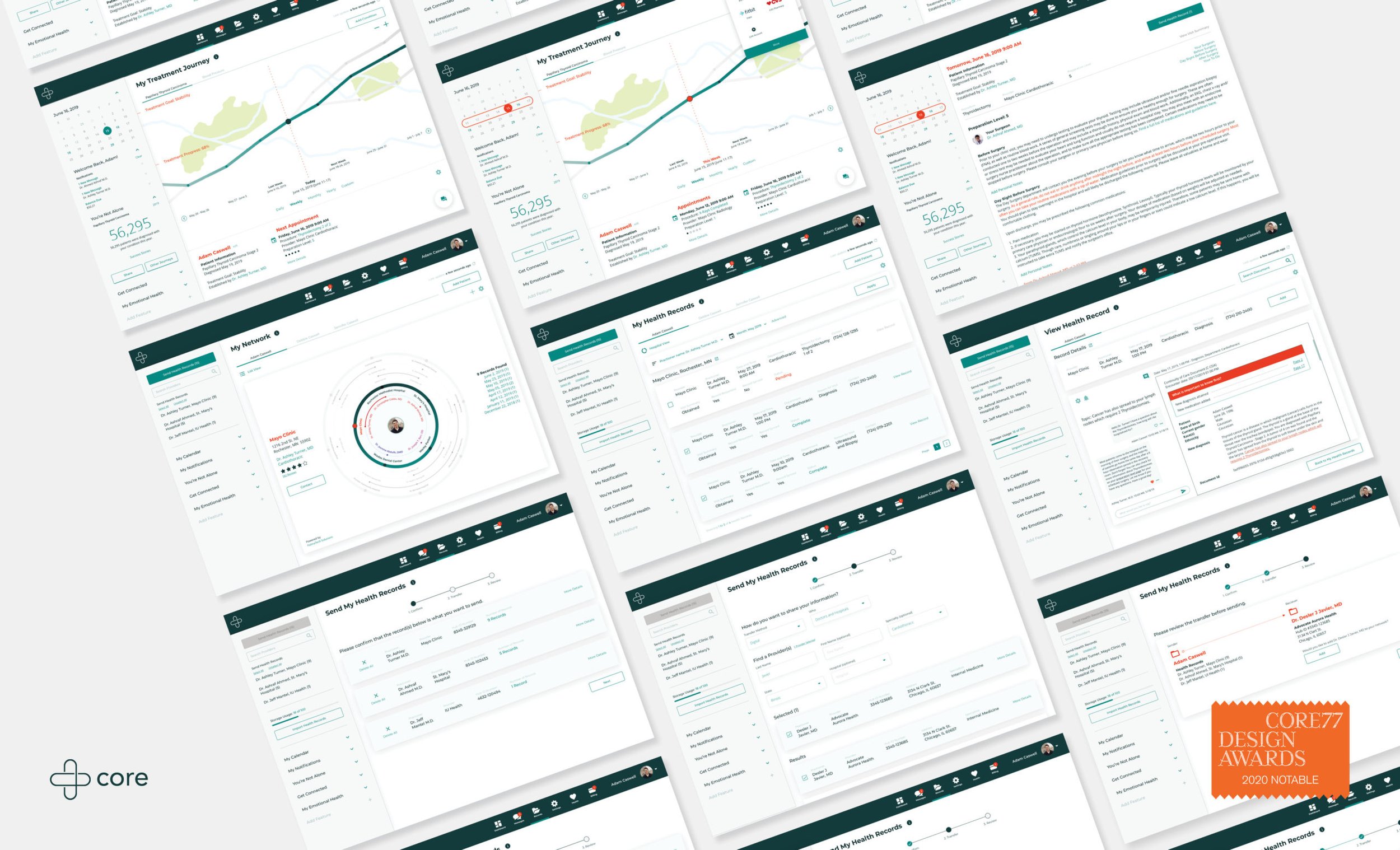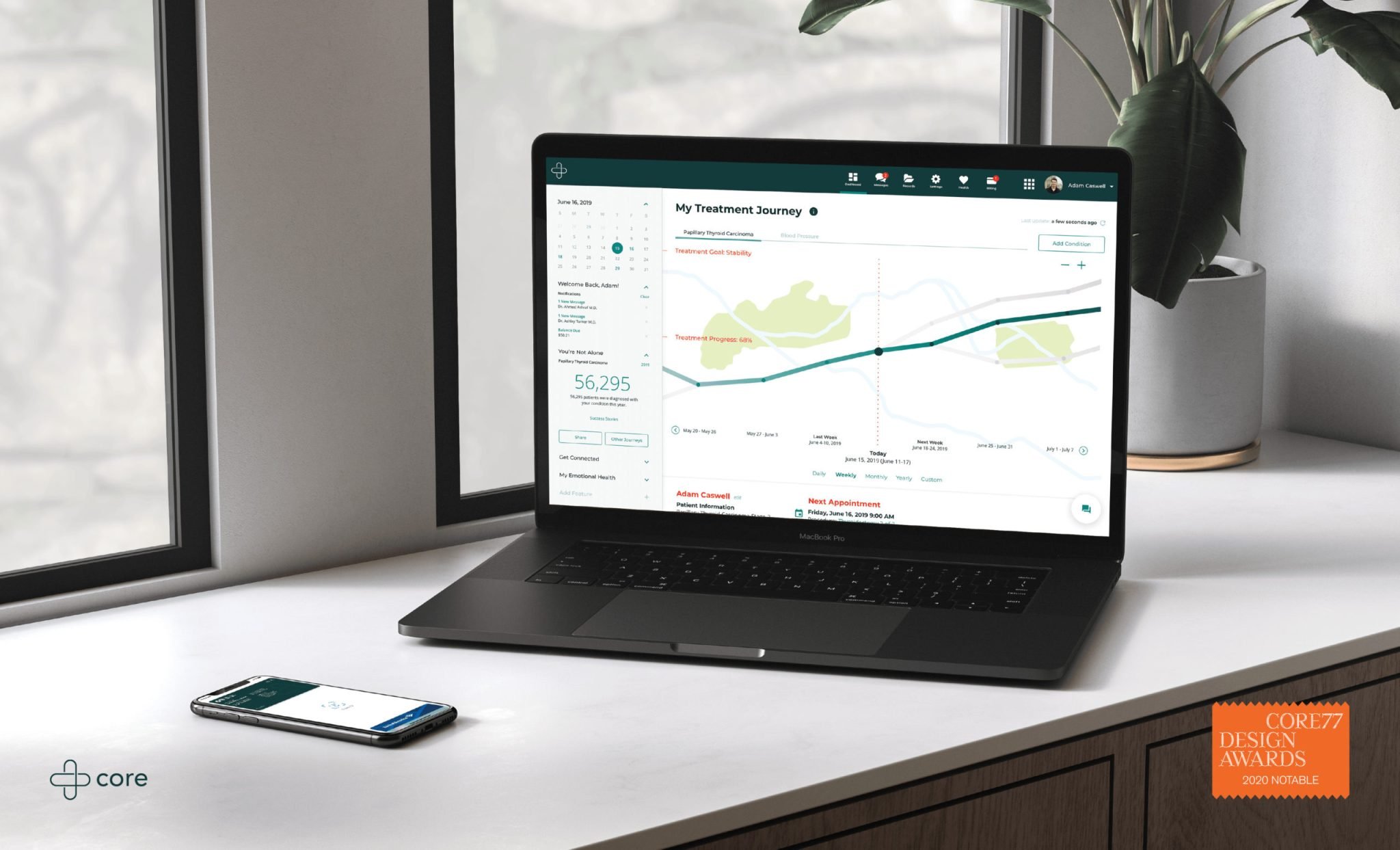Taking Healthcare Into Our Own Hands
This post was originally published on July 16, 2020.
This Summer, DFA Purdue founder, DFA National Project veteran, and former DFA National intern Jesse Palma won a Service Design Award, Student Notable in the 2020 Core77 Design Awards for his senior thesis, Core Patient Care System. He then went on to receive the Community Choice Prize in his category, providing Jesse with a bigger platform to inspire change within the healthcare space.
We sat down with Jesse to learn about the inspiration behind his award-winning concept and how his DFA experience impacted its development.
Tell us about yourself.
My name is Jesse Palma, I’m a multidisciplinary designer with a focus on UI/UX and Industrial Design. I graduated from Purdue University in December 2019 with a bachelors in Industrial Design. Currently, I’m a user experience designer at Avanade, a joint Venture between Accenture and Microsoft.
I co-founded the DFA Purdue studio back in 2015 and I was part of the studio leadership during my 4 years in college, along with being on 4 projects, 2 of them being DFA National projects with SPAM/Hormel Foods and P&G|FFRG. I was also a design intern at DFA National during the summer of 2017.
What inspired your project?
My project, Core, tackles the challenges of navigating the patient health record system for the first time and the utilization of patient data for better health. It took me a long time to understand the concept of how my health record, an electronic application to manage health information, is supposed to help me.
Things changed when I was about to graduate. I wanted to take more direct action in my health. After requesting records from hospitals I’ve received care from and going through secondary research, I observed that managing a health record adds to the burden of also having a condition to take care of, when in reality, it should only be the condition that the patient and doctor is focused on.
What was the process like for you?
For the beginning phases of my project, I spent a lot of my time interviewing people about their experience with health records and read endless amounts of articles, until I found an unexplored problem area to move forward with by interviewing one of my friends from the Purdue Filipino Association club, Claudia Guevara. Claudia was diagnosed with Papillary Thyroid Carcinoma Stage 2 at the age of 22. When she was initially diagnosed, her doctors kept telling her it’d be temporary and that it’s common. Little did they know, it was the worst case scenario.
She had many small nodules growing in her lungs that would never go away and she didn’t really understand the full implications of this diagnosis until a year later. It took her 3 years to be able to manage her health through a system she created for herself and ideally, it shouldn’t have taken that long. She wished she had more information about what could happen. She said to me, “When a patient is diagnosed with a serious condition, the doctors think, ‘how can we cure this?’ And they go on and create a game plan, which is great. But they also have to think of what kind of life the patient wants to live. I think that gets lost, and it shouldn’t.”
I uncovered an opportunity to create a solution for young adults recently diagnosed with a chronic condition. I wanted to answer the question, “How Can We provide young adults diagnosed with chronic conditions the resources needed to understand their condition, plan for their treatment, and adapt it to their desired lifestyle with an accessible, hospital-wide system?”
How did your DFA experience affect how you approached the challenge?
I used every step of the DFA design process, from identifying the broad problem space of health records to building out my ideas through wireframing and prototyping. DFA taught me the importance of talking to people, empathizing with them, and co-designing with them instead of for them. Combining DFA’s process with my background in Industrial Design set the basis of this project. After talking to Claudia and finding my direction, I made sure to keep in touch with her and other users to make sure that what I was designing is actually solving a problem. From ideation to wireframes and prototype to final product, I used an agile development methodology and co-designed with Claudia by my side.
What advice do you have for others?
The most challenging part of the process was staying motivated to push forward. I kept on hitting roadblock after roadblock, feeling like I kept hitting a dead-end, but it’s all about perseverance to wanting to solve a problem that needs to be solved. My advice to others who are tackling complicated challenges like this is to talk to your users, empathize with them and work alongside them throughout the project. Your research can’t replace their experience or knowledge, which is why they need to be there every step of the way to offer their perspective.
How did you react when you heard the news that you won an award?
I cried tears of joy. This award means a lot to me because it inspires people to tackle these types of challenges. Core77 gave me a platform to empower people to effectively manage their own healthcare journey and I couldn’t be happier.
How can others make an impact in this problem space?
Challenge your doctor and hospital and speak up about the issues you’re having when it comes to accessing or transferring your records. You own your records and you have the right to access them.
Connect with your doctor on a frequent basis outside of just annual appointments and physicals. You know your health better than anyone and having an advocate takes more than just an appointment. Doctors need to consider how you want to live the life you want to live, along with your treatment plan.
Take initiative over your health and ask questions about what your health record means. Understand what’s on there and work with your doctor to leverage your patient data for better health care.
If you’re interested in starting a conversation with Jesse or want to talk more about health records, reach out to him and he’ll be happy to talk with you. You can view more details about Core and Jesse’s other projects here.




